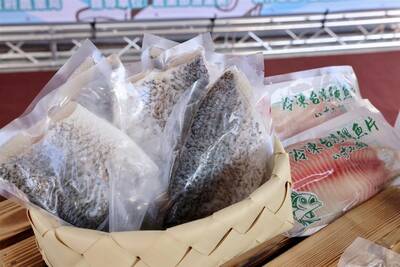Political commentator Wu Tzu-chia (吳子嘉) was yesterday indicted for aggravated defamation and other charges over claims of corruption in the government’s procurement of COVID-19 vaccines.
Prosecutors said that Wu was charged with defamation in both criminal and civil lawsuits for failing to verify his sources.
The criminal charges by the Taipei District Prosecutors’ Office came after the Taipei District Court last month ruled in a civil suit that the My-formosa.com president should pay former minister of health and welfare Chen Shih-chung (陳時中) NT$3 million (US$93,850) for defamation.

Photo: Wang Yi-sung, Taipei Times
In a YouTube livestream in 2022, Wu claimed that Chen and then-premier Su Tseng-chang (蘇貞昌) illegally earned US$100 million in a government plan to procure Pfizer-BioNTech vaccines.
Wu alleged that the number of vaccines the Ministry of Health and Welfare ordered was the same as the number of vaccines “gifted” to the state by Hon Hai Precision Industry Co founder Terry Gou (郭台銘), but their prices differed by US$100 million.
Wu also alleged that Democratic Progressive Party (DPP) Legislator Wu Ping-jui (吳秉叡) and Taiwan Biotech Co were involved in the deal, resulting in Su granting the ministry approval to send BioNTech US$50 million along with the contract.
On May 20 last year, Wu Tzu-chia said online that the government and Pfizer-BioNTech had inked a contract that was later frozen, and repeated his claims that Chen and Su benefited by earning US$100 million from the deal. He added that the government had sealed the files so no one would be able to see their contents for three decades.
Su and Chen then sued Wu Tzu-chia for defamation.
Wu Tzu-chia said his source was Fosun Pharma’s representative in Taiwan, Wang Bingfong (王秉豐), who had given him records of text messages and documents showing that Lin Chuan (林全), chairman of TTY Biopharm Co, the Asian distributor of Pfizer-BioNTech vaccines manufactured by Fosun Pharma, intended to sell 30 million vaccines for US$28 per dose to Taiwan.
While initially interested, the ministry pulled back after Wu Ping-jui, Taiwan Biotech and Hong Kong-based Jacobson Pharma intervened, Wu Tzu-chia said.
The ministry, through Taiwan Biotech and Jacobson Pharma, contacted BioNTech, offering to purchase vaccines directly at a higher price, Wu Tzu-chia said.
However, prosecutors said Jacobson Pharma had not directly impacted the deal, nor had the government asked to purchase vaccines through the company.
The prosecutors also said that Wang had never met with Jacobson Pharma or Taiwan Biotech officials, and that Wang’s source was Fosun Pharma CEO Huang Xianhui (黃獻輝), whose sources were based on hearsay. Prosecutors therefore concluded that Wu Tzu-chia had failed to verify his information.
They dismissed Wu Ping-jui’s litigation against Wu Tzu-chia and Chinese Nationalist Party (KMT) Legislator Hsu Chiao-hsin (許巧芯), stating that the issue of vaccine purchases during the COVID-19 pandemic was an essential matter and should be made available for public scrutiny.
Additional reporting with CNA

Taiwan's Vice President Hsiao Bi-khim (蕭美琴) said Saturday that she would not be intimidated by the Chinese Communist Party (CCP), following reports that Chinese agents planned to ram her car during a visit to the Czech Republic last year. "I had a great visit to Prague & thank the Czech authorities for their hospitality & ensuring my safety," Hsiao said on social media platform X. "The CCP's unlawful activities will NOT intimidate me from voicing Taiwan's interests in the international community," she wrote. Hsiao visited the Czech Republic on March 18 last year as vice president-elect and met with Czech Senate leadership, including

There have been clear signs of Chinese Communist Party (CCP) attempts to interfere in the nationwide recall vote on July 26 in support of Chinese Nationalist Party (KMT) legislators facing recall, an unnamed government official said, warning about possible further actions. The CCP is actively involved in Taiwanese politics, and interference in the recall vote is to be expected, with multiple Chinese state media and TAO attempts to discredit the Democratic Progressive Party (DPP) and undermine public support of their recall movement, the official said. This interference includes a smear campaign initiated this month by a pro-Beijing Hong Kong news outlet against

A week-long exhibition on modern Tibetan history and the Dalai Lama’s global advocacy opened yesterday in Taipei, featuring quotes and artworks highlighting human rights and China’s ongoing repression of Tibetans, Hong Kongers and Uighurs. The exhibition, the first organized by the Human Rights Network for Tibet and Taiwan (HRNTT), is titled “From the Snowy Ridges to the Ocean of Wisdom.” “It would be impossible for Tibetans inside Tibet to hold an exhibition like this — we can do it. because we live in a free and democratic country,” HRNTT secretary-general Tashi Tsering said. Tashi Tsering, a Taiwan-based Tibetan who has never

A first shipment of five tons of Taiwan tilapia was sent from Tainan to Singapore on Wednesday, following an order valued at NT$600,000 (US$20,500) placed with a company in the city. The products, including frozen whole fish and pre- cooked fish belly, were dispatched from Jiangjun Fishing Harbor, where a new aquatic processing and logistics center is under construction. At the launch, Tainan Mayor Huang Wei-che (黃偉哲) called the move a “breakthrough,” marking Taiwan’s expansion into the Singaporean tilapia market. Taiwan’s tilapia exports have traditionally focused on the United States, Canada, and the Middle East, Huang said, adding that the new foothold in